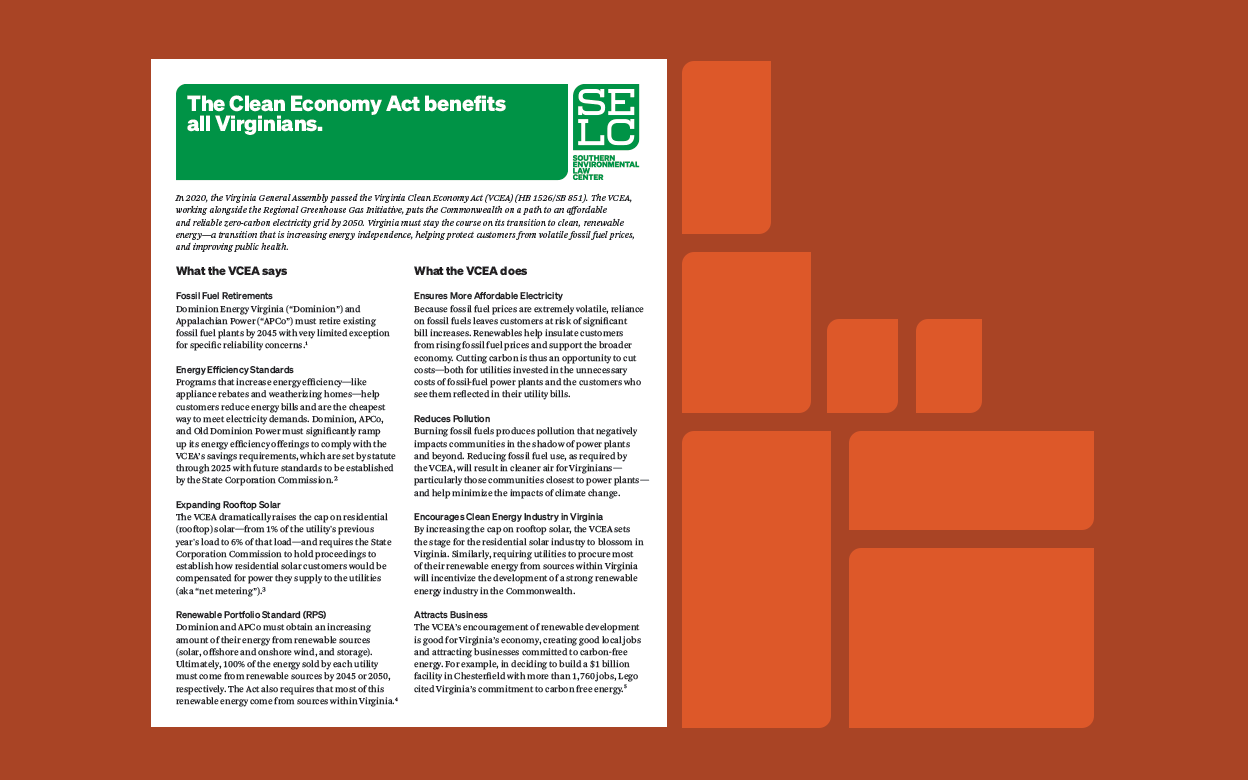Virginia’s path to a zero-carbon future
How is Virginia cutting carbon?
Climate change requires that we cut carbon now — and Virginia is taking action. Undoubtedly the boldest climate legislation to come out of the South, the Virginia Clean Economy Act (VCEA) set the Commonwealth on a new clean energy path that charted the course toward a zero-carbon electricity grid by 2050. The legislation accelerates the retirement of fossil-fuel power plants, expands solar and offshore wind installations, establishes a statewide energy efficiency standard, and increases rooftop solar by 600 percent. Virginia lawmakers recently acted in the best interest of the state’s residents when they approved the Affordable Energy Act, removing restrictions preventing the State Corporation Commission (SCC) from lowering electric utility rates when the SCC determines customers will be overcharged. The move restoring the SCC’s regulatory abilities means Virginians could pay less for energy.
The Southern Environmental Law Center was central to developing and building support for each of the VCEA’s policy provisions and the Affordable Energy Act, and we’re advocating before the SCC and in other venues to make sure they’re properly implemented.
But the VCEA is far from the only way Virginia is working to cut carbon. Virginia is the first state in the South to participate in the Regional Greenhouse Gas Initiative (RGGI), an emissions reduction program that nearby states have benefitted from for over a decade. By requiring utilities to pay for each ton of carbon dioxide they emit when they burn fossil fuels, states participating in RGGI have cut carbon dioxide emissions 90 percent faster than the rest of the country. Since 2021, Virginia has been participating, too, making progress towards a zero-carbon future.

The Clean Economy Act benefits all Virginians
Virginians are reaping the economic benefits
Virginia is proving that a clean environment and a strong economy go hand-in-hand. Cutting carbon is also an opportunity to cut costs — both for utilities invested in the unnecessary costs of fossil-fuel power plants and the customers who see them reflected in their utility bills. Reliance on fossil fuels also leaves customers exposed to price volatility, a risk that can result in significant rate increases to customers. As fossil fuels come offline, SELC is pushing hard to build a clean energy economy that is cost-effective and beneficial to all Virginians. Renewables help insulate customers from rising fossil fuel prices and support the broader economy. Another estimate of the VCEA’s expanded investment in solar anticipates the creation of more than 29,000 solar jobs and more than $7 billion in total economic impact. The ultimate winners of Virginia’s efforts to cut carbon are residents across the Commonwealth, who are already benefiting from more jobs, lower costs and a stronger economy.
SELC is fighting for clean energy equity in Virginia
Cutting carbon is already creating a more equitable playing field for all Virginians. Virginia’s participation in RGGI isn’t only improving public health by reducing air pollution; thanks to the requirement that utilities pay for each ton of carbon dioxide they emit when they burn fossil fuels, participation in RGGI is bringing in hundreds of millions of dollars for the Virginians most vulnerable to climate change. About half of the proceeds are devoted to communities in danger of flooding — not just on the coasts, but along Virginia’s rivers and on its Main Streets. The other half is funding upgrades to inefficient housing to cut low-income families’ energy bills, as well as to fund new energy-efficient affordable housing. From the coasts to the coalfields, investments like these are making a measurable difference for Virginians who have historically borne the brunt of climate change. With fossil-fuel plants disproportionately concentrated in low-income and communities of color, cutting carbon is an urgent matter of environmental justice.
Recent news on Virginia clean energy
Additional Resources

Gardening Tidewaters

Flood City

Uncharted Territory

Riding the Solar Coaster


